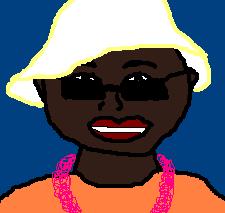Damn. Which way to MLK Boulevard?
In the course of my reporting, I often refer to a book called The North Carolina Gazetteer: A Dictionary of Tar Heel Places. As its name implies, the book contains geographic information about the state, including details about counties, towns, cities, rivers, creeks, lakes and mountains. My worn copy, which dates back to 1982, sits on a small bookshelf to the right of my cubicle, within easy reach in fact-finding emergencies.
Once I was working on a news story about the Department of Justice's recent efforts to investigate unsolved deaths from the Civil Rights era. I'd obtained documents that suggested there were unsolved, racially motivated killings in three North Carolina towns: New Bern, Shelby and Gaston. I needed to match those towns with their respective counties in order to contact the local branches of the NAACP, which organize at the county level. Of course, I grabbed the Gazetteer. While thumbing through the book's 'N' section, I discovered some of the state's old geographic treasures.
There's Nigger Bay, which lies between Swan Island and Currituck Banks in northeast Currituck County. Nigger Head, a mountain on the Clay-Macon County line, climbs to 4,900 ft. Niggerhead Creek rises in east Union County and flows into northwest Richardson Creek. Nigger Mountain, also known by its proper name, Mount Jefferson, is in Ashe County. Niggerskull Creek rises in central Jackson County and flows southwest into Tuckasegee River.
And there is Nigger Skull Mountain (not to be confused with Niggerskull Mountiain) in west Haywood County on the head of East Fork. Niggerskull Mountain (for Nigger Skull Mountain, see above) is in central Jackson County between Niggerskull Creek and Gladie Creek. Nigger Spring, in south Haywood County, feeds into the Little East Fork Pigeon River.
I turned to the 'W' section of the book, looking for a little justice. I found Whitehead Creek, White Hill, White Lake, White Marsh, White Pond, White Rock, Whites Creek, Whites Crossroads, Whites Island, Whites Store, Whites Swamp, Whites Township and, of course, Whiteville. No White Trash, though. And I couldn't find any mountains or lakes named after cracker-ass-crackers or honkeys.
I picked up the phone and called my local county branch of the NAACP. "Hey man, this is Quint...yeah, me again! You aren't gonna believe this one..."
Once I was working on a news story about the Department of Justice's recent efforts to investigate unsolved deaths from the Civil Rights era. I'd obtained documents that suggested there were unsolved, racially motivated killings in three North Carolina towns: New Bern, Shelby and Gaston. I needed to match those towns with their respective counties in order to contact the local branches of the NAACP, which organize at the county level. Of course, I grabbed the Gazetteer. While thumbing through the book's 'N' section, I discovered some of the state's old geographic treasures.
There's Nigger Bay, which lies between Swan Island and Currituck Banks in northeast Currituck County. Nigger Head, a mountain on the Clay-Macon County line, climbs to 4,900 ft. Niggerhead Creek rises in east Union County and flows into northwest Richardson Creek. Nigger Mountain, also known by its proper name, Mount Jefferson, is in Ashe County. Niggerskull Creek rises in central Jackson County and flows southwest into Tuckasegee River.
And there is Nigger Skull Mountain (not to be confused with Niggerskull Mountiain) in west Haywood County on the head of East Fork. Niggerskull Mountain (for Nigger Skull Mountain, see above) is in central Jackson County between Niggerskull Creek and Gladie Creek. Nigger Spring, in south Haywood County, feeds into the Little East Fork Pigeon River.
I turned to the 'W' section of the book, looking for a little justice. I found Whitehead Creek, White Hill, White Lake, White Marsh, White Pond, White Rock, Whites Creek, Whites Crossroads, Whites Island, Whites Store, Whites Swamp, Whites Township and, of course, Whiteville. No White Trash, though. And I couldn't find any mountains or lakes named after cracker-ass-crackers or honkeys.
I picked up the phone and called my local county branch of the NAACP. "Hey man, this is Quint...yeah, me again! You aren't gonna believe this one..."
